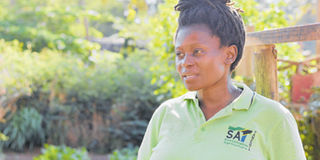At the helm of changing the face of agriculture

Agronomist and SAT-founder Janet Maro enjoys to be in SAT-Garden in Tushikamane-Centre in Morogoro. PHOTO I Hansjürg Jäger
What you need to know:
- From time to time, the driver slows down to stay on track to dodge the potholes and the dry trees and bushes along the road, which await the November rains.
On the way back to the city, the white pick-up is almost flying over the bumpy roads of Vianzi, a rural ward in Morogoro, leaving behind the red and grey dust rising up in the air.
From time to time, the driver slows down to stay on track to dodge the potholes and the dry trees and bushes along the road, which await the November rains.
Buckled up on the seat next to the driver’s is the 29-year-old Janet Maro, breastfeeding her three-month-old daughter. Her neatly braided locks are tied up in a bun which makes her appear 15 centimetres taller.
Her right arm is holding the child, while the left hand clinches the upper handle of the car. Dressed in her usual greens, she looks no different than other staff members of Sustainable Agriculture Tanzania (SAT), an organisation she and her husband Alex founded to uplift and train farmers in organic agriculture farming methods.
Janet’s mission to ending hunger in all its forms
Fourteen months earlier, Janet Maro was hosted by a Swiss Non-Governmental Orrganisation, Biovision, in Switzerland where I had met her for the first time.I had gone to Zurich to moderate a discussion between Janet and Mario, a young farmer from Switzerland. By then, the SAT operations had completed four years. In an interview, she explained that SAT is promoting organic agriculture in Tanzania. She continued, “80 per cent of our farmers are already producing organic food, it is just not certified. In order to improve the smallholder-farmers diets, SAT is training them how to grow more than just corn and beans – of which the staple diet is generally Ugali and Maharage – and include salad, spinach, tomatoes, cabbage and other legumes in their farms.”
In the pale-lighted meeting-room in Zurich, it was hard to grasp the scope of the work SAT is doing. While out of the approximately 45 million Tanzanians, around 75 per cent are engaged in agricultural activities. SAT in the last five years has trained 2500 farmers in organic farming. Compared to the millions of farmers in the country, this number seems pretty meaningless.
But there is something else, Janet explains to me while driving back to the city from Vianzi. “We do believe that development has to start at household level. And the first thing is to get enough and healthy food. And when you combat food insecurity, you are able to do better work,” Janet explains her point of view in agricultural development. She also adds that doing better work means increase in the yields. The family will gradually be able to sell their surplus in the market to escape poverty and have a sustainable future.
Why farmers believe in organic farming
In Vianzi, where the farming training centre is located, there are farmers who train other farmers in organic practices and the use of compost. According to the participating farmers, this lowers their cost because there is better use of natural resources and diversified crops which ultimately improves the balanced diet.
In addition, the courses are open for men and women. In places like Mkuyuni, the trainings are given for free. One of them, who receives her training in Mkuyuni says that she wants to increase the yield in her farm without having to use dangerous chemicals. “Since I grow my vegetables organic, the health of my children has improved,” she says while seated under the shed of a tree.
Being part of a grassroot movement, it is not surprising that Janet appreciates the positive responses from the farmers. She says, “It is always a good thing when farmers are passing by the office in the city of Morogoro just to say hello or bring some vegetables they grow in their own garden and farms.”
While motivation, mission and vision remained the same, Janet’s work did change tremendously over the last couple of months. “2016 was the year of growth for SAT, but as well as the year of institutionalisation.” Janet and Alex went a step further and started to employ people in 2011. And as the organisation grew bigger, last year, the first managers were employed. The managers organise the trainings in the farmer training centre and compile reports. This was one of the most important steps in the growth of SAT, according to Janet.
Later, as SAT was able to grow, Alex and Janet decided to invest in the motorcycles, which in turn, made it possible to train and reach more farmers in spreading the word of organic agriculture.
But training farmers is no longer the main task of Janet’s. She has become the SAT-Ambassador, as other SAT-members say. And this role seems to fit her very well. “Janet can easily talk to farmers as well as to politicians and other officials,” says Alex, Janet’s husband.
Back in the offices of Tushikamane centre in the city of Morogoro, where the managerial activities of SAT takes place, I understood what Alex meant. There, another group of farmers were attending training in the garden SAT-staff is running.
As we were touring the garden to learn about how the SAT staff plants spinach, local tomatoes and cabbage for experiments with natural pesticides and compost, Janet takes a moment to excuse herself. She approaches the group to exchange greetings. But instead of shouting ‘mambo’ to all of them, she goes to each member and shakes hands with them. She says to one of the trainee, “shikamoo mzee, it is good to see you again.”
Improving communities and eliminating dependency
A man carrying an empty yellow bucket moves towards a treadmill that SAT has installed and is being used as a water pump to water the fields. Janet in an instant rushes towards the spot and gets on the two pedals to tread. The water bubbles up and fills the man’s bucket within few seconds. She would have continued to tread if only we didn’t have to continue with the tour.
After learning about the rest of the garden and the poultry shed, we head back to the offices. Over there, professors and researchers from Sokoine University of Agriculture (SUA) have arrived for a meeting and yet again Janet greets each of the professors.
Recalling what she had said during the bumpy ride, “SAT is really coming from the grassroots. We work with the farmers and the University. We are like a family, we share, we advise each other and we grow together.”
But besides this very family-like collaboration and interaction, Janet’s success goes hand in hand with Alex’s hard work and his Austrian perfectionism. “Alex has in the last couple of years always been an important advisor and commentator. He is the person who gives me the first and most critic feedback. And that has been very helpful to work, at least one standard higher,” Janet says. In addition, it was Alex, who provided the first $200 to start SAT and now he is ‘the grand proposal-writer’, as Janet puts it.
Everyone seems to like the project and how it is set-up. “When for the first time an official car from a big international organisation parked in front of our office, I could not believe it. And still, seeing the impact this organisation has made, it is hard to believe that it is the same organisation we started in 2011,” Janet says.




